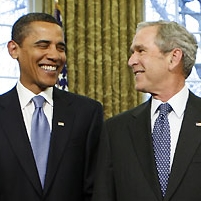Obama Fights to Retain Warrantless Wiretapping
Monday, February 20, 2012

Despite being propelled to victory by progressive supporters critical of the Bush administration’s record on civil liberties, President Barack Obama has directed the Justice Department to defend many of the policies of George W. Bush, including warrantless wiretapping. Last week, the Justice Department filed papers asking the Supreme Court to overturn an appeals court ruling that allowed the continuation of an ACLU lawsuit challenging the constitutionality of a 2008 law giving the government unprecedented authority to monitor Americans’ international emails and phone calls.
That monitoring has its origins in the wake of the September 11, 2001, terrorist attacks, when, a few years later, President Bush instructed the National Security Agency (NSA) to intercept Americans’ telephone calls without warrants, which were required by the Constitution and the Foreign Intelligence Surveillance Act (FISA). FISA, a post-Watergate statute meant to rein in domestic surveillance, created a special court, the Foreign Intelligence Surveillance Court (FISC), to approve or reject requests for domestic surveillance.
Between 1978 and 1992, presidents Jimmy Carter, Ronald Reagan and George H.W. Bush presented 7,030 applications for warrants and the court approved all of them as submitted. During his eight years in office, President Bill Clinton and his Justice Department presented 6,057 warrant applications. The FISC approved 6,055 of them, modified one and rejected one.
However, the harmonious relationship between the executive branch and the FISC changed after George W. Bush became president. The court rejected six requests outright and modified 179. It is worth noting that all eleven members of the Bush-era FISC were selected by conservative Supreme Court Chief Justice William Rehnquist. Annoyed by the FISC judges’ refusal to rubber-stamp his policies, Bush bypassed the law and ordered the NSA to secretly conduct illegal wiretapping.
When Bush’s secret program was revealed by The New York Times in 2005, the Bush administration first agreed to seek FISC approval, and when that failed, got Congress to permit the previously prohibited warrantless wiretapping by passing the FISA Amendments Act of 2008. President Bush signed the bill into law on July 10, 2008, and the ACLU filed its challenge less than an hour later. The provisions of the act are scheduled to end at the end of 2012.
The appeals court ruling, which was issued in March 2011, rejected the Obama administration’s argument that the case should be dismissed because the ACLU’s clients could not prove their communications would be collected under the law, which was true largely because the law creates great secrecy around the wiretaps in the first place–a true “Catch-22.”
-Matt Bewig, David Wallechinsky
To Learn More:
Obama Administration Asks Supreme Court to Dismiss ACLU Challenge to Warrantless Wiretapping Law (by Ateqah Khaki, ACLU)
A Brewing Battle Over Warrantless Wiretapping (by Jameel Jaffer, ACLU)
Federal Court Gives Go-Ahead to NSA Illegal Surveillance Case (by Noel Brinkerhoff and David Wallechinsky, AllGov)
Obama Refuses to Release Bush’s Legal Excuse for Illegal Surveillance (by Noel Brinkerhoff, AllGov)
First Court Ruling that Bush Administration Wiretapping was Illegal (by Noel Brinkerhoff, AllGov)
Obama Working on Plan to Wiretap Skype, Facebook, BlackBerrys (by Noel Brinkerhoff, AllGov)
What is the Bush Administration Trying to Hide? (by David Wallechinsky, Huffington Post)
- Top Stories
- Unusual News
- Where is the Money Going?
- Controversies
- U.S. and the World
- Appointments and Resignations
- Latest News
- Musk and Trump Fire Members of Congress
- Trump Calls for Violent Street Demonstrations Against Himself
- Trump Changes Name of Republican Party
- The 2024 Election By the Numbers
- Bashar al-Assad—The Fall of a Rabid AntiSemite






Comments